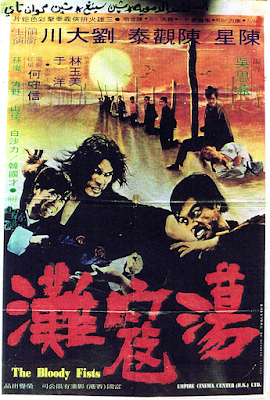The Bloody Fists
(1972)
Aka: Death Beach; Deadly Buddhist Raiders
Chinese Title: 蕩寇灘
Translation: Lake Beach Bandits
Starring: Chen Sing, Henry Yu Yang, Chen Kuan-Tai, Fong
Yau, San Kuai, Lau Tai-Chuen, Hoh Sau-San, Sun Lan, Hon Gwok-Choi, Lam Yuk-Yang
Director: Ng See-Yuen
Action Director: Yuen Woo-Ping, Yuen Cheung-Yan
The Bloody Fists is mainly notable today as one of the earlier choreography gigs for Yuen Woo-Ping, the legendary action director known for directing Jackie Chan’s first two hits, for choreographing some of Jet Li’s finest hours and for working on a plethora of international hits, like The Matrix trilogy, the Kill Bill films, and Crouching Tiger, Hidden Dragon. Obviously, he didn’t start out as “the guy who did—“, but instead work on a number of lesser-known Shaw Brothers films and independent bashers, before he found more prestigious work in 1977. Nonetheless, The Bloody Fists demonstrates that even this early in his career, Yuen Woo-Ping already had that special touch that placed him above his contemporaries.
The story is essentially a reworking of The Chinese Boxer. After a random encounter between Jiang Wuke (Chan Sing, of The Himalayan and Heroes of the Wild) and some government official—the scene is filmed in such a way that we’re not even sure who the good guys and bad guys are—we open with Chen San (Sun Lan, who showed up in Ng See-Yuen’s Call Me Dragon) showing up in some Chinese coastal town some years after the residents had kicked him out. Apparently, Chen San was the town’s resident asshole and the denizens of the town got tired of it and sent him packing. However, Chen San has come with with some friends, a samurai named Okagawa (Chen Kuan-Tai, of The Men from the Monastery and Iron Monkey) and his bushido buddies, including Fong Yau (Broken Oath) and San Kuai (Mantis Fist and Tiger Claws of Shaolin).
The town is best known for producing a plan called “Dragon Herb”—cue lots of dialog about people demanding to know “where the herb is”—which is known throughout the land for its medicinal properties. Okagawa and his men want to get their hands on the town harvest, as their’s an epidemic going around and they plan to barter it to Chinese authorities in exchange for the release of imprisoned Japanese citizens. Opposing them are a trio of kung fu experts: Yu Yang (Henry Yu, of The Awaken Punch), Lau Tai-Chuen (of The Thunder Kick) and Hoh Sau-San (of The House of 72 Tenants). But these three aren’t good enough for the Japanese and their dirty fighting tricks, so eventually the Fugitive (Chan Sing), who’s passing through town to visit his grandfather (Hao Ji-Len, who plays Bruce Lee’s uncle in Enter the Dragon), gets involved too.
There seem to be two versions available, one that runs about 82 minutes, retitled Death Beach, and one that runs 97 minutes. Watching both, the main differences between the two can be summed up in two scenes. In the former, Yu Yang is introduced with his girlfriend (Lam Yuk-Yan) as the two are frolicking on the beach. There’s a hard cut to a scene of Chen San brutalizing the locals before Yu Yang shows up out of nowhere and scares him off. In the full version, the two are met on the beach by a mute kid (Hon Gwok-Choi of Call Me Dragon and Little Superman) who informs them of the trouble going on back in the village. Why that scene was excised I do not now.
I can imagine that the other big scene, where San Kuai rapes a young woman, was removed. That might very well have been the difference between an ‘R’ and ‘X’ rating in the States, given the mood the MPAA was in at the moment. That scene actually lasts a long time and has all sorts of nudity on display. From a story point of view, the scene is disturbing because the victim is none other than Chen San’s sister(!). At one point, Chen San walks into the room and gets manhandled by San Kuai for interrupting his “fun” and when Chen San realizes who he’s raping, he doesn’t even bat an eye. That’s just awful.
What’s not awful about the movie is the fighting, brought to you by Yuen Woo-Ping and his equally-prestigious brother, Yuen Cheung-Yan (best known in the West for his work on the Ben Affleck Daredevil film and the Charlie’s Angels movies). Yuen Cheung-Yan had worked on Vengeance!, one of the earliest examples of the modern kung fu movie. His hand-to-hand combat was a bit crude, but the knife fights were bloody, intense and fun to watch. It would seem that Cheung-Yan had matured quickly in those ensuing two years, while Yuen Woo-Ping was at the top of the heap from the outset.
The
action is mainly fisticuffs, although Chan Sing does fend off Chen Kuan-Tai’s katana with a sai sword at the finale. What surprises me is simply how crisp the
punches and kicks are. Early 70s bashers are often characterized by swingy-arm
haymaker punches and weak, low kicks that rarely go above the waist. In this
film, the kicks are generally high and strong, something that wasn’t common to
see outside of a Bruce Lee film. Better yet, the handwork is choreographed with
a level of complexity that wouldn’t be seen before the start of Chang Cheh’s
Shaolin Cycle in 1974. It’s really ahead of a time, especially when so many of
its contemporaries preferred to have the fighters dodging each other’s sloppy
hand strikes instead of an actual exchange of blocks and blows. None of the
actors stand out in particular, but the fighting stands a rung or two above the
action in the previous month’s King Boxer.






No comments:
Post a Comment